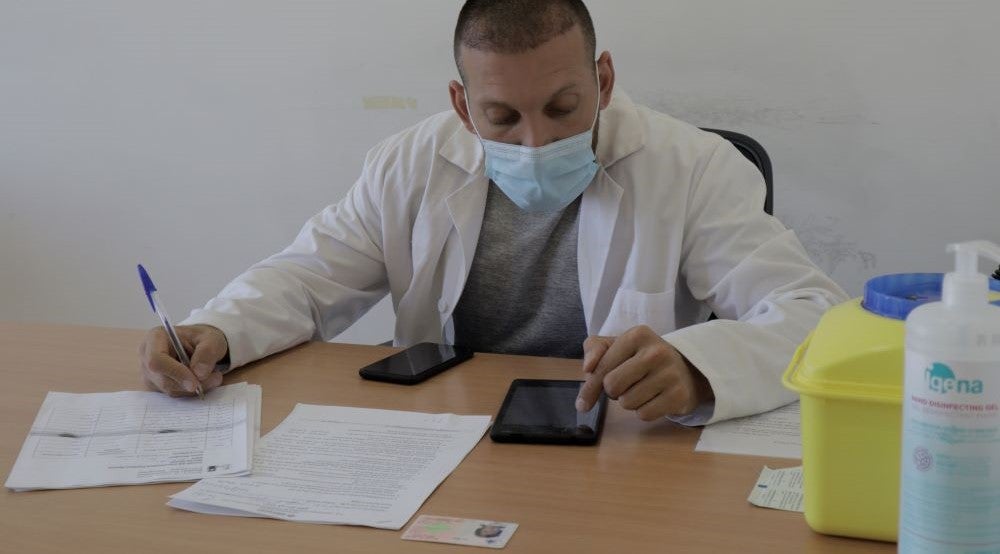 رجل يستخدم منصة الويب IMPACT لتطعيمات COVID-19 في لبنان.
رجل يستخدم منصة الويب IMPACT لتطعيمات COVID-19 في لبنان.
In Lebanon, the ongoing socioeconomic and political crises coupled with the public angst following the Port of Beirut explosion have further diminished public confidence in the ability of the government to deliver services. The COVID-19 pandemic posed additional challenges to an already weakened health system. The World Bank extended support to the Government of Lebanon to initiate COVID-19 vaccination under the Lebanon Health Resilience Project, and throughout the year, this investment paid off: launched on February 14, 2021, the COVID-19 vaccination campaign was implemented in a transparent, equitable, and efficient manner, and has contributed to reducing COVID-19 hospitalizations and deaths. The campaign relied on an innovative approach for data transparency based on the digitalization of vaccination data, which has significantly enhanced public trust in the vaccination program. This approach utilizes the digital platform pioneered by the Inter-ministerial and Municipal Platform for Assessment Coordination and Tracking (IMPACT).
What is IMPACT?
IMPACT is a state-of-the-art information system championed by the Central Inspection Bureau (CIB). Initially created to digitalize the government’s audit exercise, the platform provides CIB inspectors with data related to the administrative, financial, engineering, education, health, agricultural, and environmental inspectorates. To support the government’s response to the pandemic, sectoral modules were added, including the National Vaccination module. The latter stores all data relevant to the vaccination process on dedicated servers in compliance with data protection regulations and under the oversight of the CIB, with administrative access restricted to specifically authorized Ministry of Public Health administrators and medical staff.
The IMPACT national vaccination platform has multiple pages and modules, namely:
- The user-facing registration module supports self-registration and assisted registration. The same module is used for the reporting of adverse events following immunization, as well as the viewing and printing of vaccination certificates.
- The vaccination module – accessible only to vaccination centers’ staff – allows vaccination sites to enter vaccine recipients’ information including the pre-vaccination assessment, the vaccine administered and its batch number. It also triggers the generation of electronic vaccination certificates that are viewable in the user-facing module.
- The administration page – accessible only to authorized administrators – supports the vaccination process, with unified monitoring of vaccination centers and a daily list of patients to be vaccinated.
- The call center assists with rescheduling, resending appointments and other vaccination-related processes.
Online dashboards are generated from the platform and made available to the public on IMPACT’s open data website, allowing all relevant stakeholders to view the progress of the national vaccination campaign in real time. The public dashboards display real-time aggregate data on registration and vaccination, with breakdowns by characteristics such as age, gender, governorate, and nationality. The ease of access to data through these dashboards has boosted the transparency of the vaccination rollout and has been instrumental in enhancing public trust in this campaign. IMPACT follows a privacy policy for its national vaccination platform that is compliant with national laws, and it has also taken strong measures to ensure that data is secure and free from the threats of hacking, data breaches and malicious attacks.
Remaining challenges for the national COVID-19 vaccination platform
Many challenges remain for the operation of the platform. The platform has so far been financed by donor contributions, but the continued availability of resources to ensure its sustainability is not guaranteed. Although instances of data duplication and certain glitches that initially affected pre-registration and appointment allocation have now been resolved, the complexity of the platform and the addition of new features could generate new software bugs that would need to be addressed. The required internet connectivity for the use of the platform can also create access challenges for the poor and those who live in remote areas without connectivity, further enhancing the digital divide (an offline version of IMPACT has already been piloted in remote areas).
Lessons learned from the COVID-19 vaccination platform and opportunities for its further use
The success of the COVID-19 vaccination platform creates an opportunity to foster a national culture of digitalization, transparency, data sharing, and evidence-based policymaking, beyond the COVID-19 response. Within the health sector, there is an opportunity to create a unified data repository to link several information systems that can support universal health coverage, such as electronic medical records, disease surveillance systems, and referrals and counter-referrals using unique national IDs as identifiers. Beyond the health sector, the platform can and is being used for other large-scale, population-based programs. Specifically, IMPACT is being used in the launch of the nationwide registration for Lebanon’s two major social safety net programs: the World Bank-funded Emergency Crisis and COVID-19 Response Social Safety Net Project (ESSN) and the Broad-coverage Cash Transfer program (BCCT) aim to provide cash transfers to more than half the Lebanese population.
To fully realize the potential of the platform, however, the government and stakeholders must commit to supporting it and empowering it, not only by securing the funding necessary for its operation, but also by championing the good governance of digital health platforms, ensuring compliance with principles of transparency, automation, and data protection; developing solutions to reach people with limited connectivity; and using the platform as a pivot for nationwide social sector interventions needed to build the Lebanon of tomorrow.






Join the Conversation